Commentary
(pdf)Early in Apr 1789, Mozart embarked on a trip to Berlin with Prince (Fürst) Karl Alois Lichnowsky (1761–1814). It is generally held that the pair left Vienna on the morning of Wed, 8 Apr. No direct documentation for this date is known, but it is supported by contextual evidence. On 8 Apr Mozart wrote a letter to his wife Constanze from Budwitz (Moravské Budějovice), the eighth post station on the route from Vienna to Prague:
Unterdessen der Fürst im Pferd=Handel begriffen ist, ergreif ich mit Vergnügen diese Gelegenheit um Dir, Herzensweibchen, ein paar Worte zu schreiben. [...]
[Briefe, iv:79]
While the Prince is occupied with negotiations over horses, I am gladly taking the opportunity to write a few words to you, my dear wife. [...]
Budwitz was a long but possible day’s travel from Vienna by carriage in the eighteenth century, around 118 km.

Post stations on the route from Vienna to Prague
Neuer Post= und Reise=Atlas von ganz Deutschland [...],
Nuremberg: Weigel and Schneider, [1790], map VI
As this map shows, a “Post-Station” was in effect a measure of distance. It was equivalent to 2 Deutsche Meilen, where a Deutsche Meile was equal to 7420.44 meters or 7.4 kilometers.
In any case, it is generally assumed that Mozart did not leave Vienna before 8 Apr. Zinzendorf, in his diary entry for 7 Apr, reports attending a performance that evening of Handel’s Messiah (certainly in Mozart’s arrangement) at Count Johann von Esterházy’s:
Avant 7h. au Concert chez Jean Eszterhazy. Der Meßias, une
musique de Haendel. J’y pris un peu d’ennui quoique la musique fut
bien belle. [...]
Before 7 to the concert at Johann Esterházy’s. The Messiah,
a composition by Handel. I became a bit bored, although the
music was quite beautiful. [...]


Count Karl von Zinzendorf, diary entry for 7 Apr 1789
Vienna, Haus-, Hof- und Staatsarchiv, Kabinettsarchiv,
Nachlass Zinzendorf, Tagebücher 3 4 (Tagebuch 1789)
We have no direct confirmation that Mozart directed this performance, but it seems likely that he did.
Mozart and Lichnowsky arrived in Prague on Good Friday, 10 Apr 1789, around 1:30 in the afternoon (see Mozart’s letter on that date, Briefe, iv:79–80). If they did indeed leave Vienna on the morning of 8 Apr, they had traveled a distance of 295 km in two and half days, probably without overnight stops.
Mozart was already in serious financial distress by this point in 1789, and prospects for earning significant income in Vienna in the coming months probably seemed slim (for a summary of Mozart’s borrowing in these years, see Brauneis 1991, 159). The public concert season in Vienna had ended on Sun, 5 Apr, with the second concert of the Tonkünstler-Societät. (The private performance of Messiah on 7 Apr took place on Tue of Holy Week.) Thus the idea of a trip to Berlin as an opportunity to earn performing income during the off season in Vienna would have been appealing. Prussian King Friedrich Wilhelm II (reigned 1786–1797) was a music enthusiast, and Mozart’s Die Entführung aus dem Serail, which had its premiere in Berlin on 16 Oct 1788, was well on its way to becoming a great success there. Otto Jahn (1859, iv:468) suggests that Prince Lichnowsky had invited Mozart to accompany him, so the prospect of free travel would have been welcome.
The item transcribed at the top of this page—a one-sentence report of Mozart’s departure for Berlin, published in the Staats= und Gelehrte Zeitung des Hamburgischen unpartheyischen Correspondenten on 22 Apr 1789—is not significant for its content: we already knew about Mozart’s trip. If read literally, the report’s reference to Mozart having departed for Berlin “vorgestern” (in an article with the dateline 11 Apr 1789) would imply that he had left on 9 Apr, which is certainly wrong: a carriage could not make the journey from Vienna to Prague in a day and a half. The report’s significance lies, rather, in the fact that Mozart’s fame by this time was great enough that his departure for Berlin was sufficiently newsworthy to report in far-away Hamburg. (On the reception of Mozart’s music in Hamburg, see our entry for 19 Feb 1792.)
